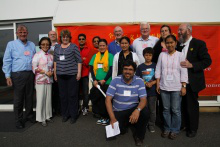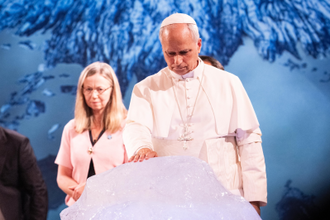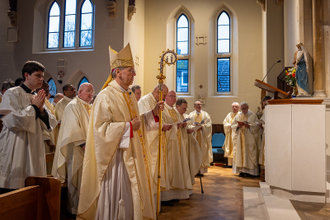NJPN China Conference: Freedom to be Catholic

Members of Columban Missionary Society - originally Maynooth Mission to China. photo: Yuan-Chao Xue
A poignant moment during last weekend's National Justice and Peace Network conference on China was a skype call with Sr Mary Niu, who was sitting 5,000 miles away in a contemplative Chinese monastery, the first constructed since 1949. It was the early hours of the morning in China and Sr Mary and another sister appeared as silhouettes on the two big screens in the conference hall. The 300 people present couldn't make out their faces but could hear their greeting, and a cheer went up when the call finished. It seemed they were speaking to the conference in secret, not daring to turn many lights on.
In fact, the Chinese Communist government has allowed more religious freedom over the last three decades than many Catholics in the West realise. There are restrictions, but Catholics - at least 12 million of them - can now openly go to Mass, seminarians openly train to be priests and religious follow their vocations. Conference speaker Scottish Cardinal Keith O'Brien said that when he visited China in 2007 with UK-based Cultural Exchange with China the government regarded it as an official visit. He was given accommodation in an executive suite on the 25th floor with a butler! He was also given a driver from the State Administration for Religious Affairs, perhaps keeping an eye on him, but nevertheless the government played its part in welcoming his presence and allowing him to experience the new openness that was China and the "flowering" of the Catholic Church there.
Yet, the weekend conference reminded us of the persecuted Church that was China within living memory. Three decades ago, China's Cultural Revolution saw some of the most dramatic restrictions on the practice of religion ever seen in the modern world. Foreign missionaries - such as the Columban Fathers - were expelled by the Communist government in the early 1950s. Terrible persecution of people of faith followed in the 1960s and early 1970s - not just Christians but Buddhists and others too.
A Chinese Church scholar at the conference gave a vivid picture of that time. One of his uncles, a Catholic priest, was paraded in the streets and ridiculed during the Cultural Revolution in 1966. He was imprisoned and tortured, having an ear torn off and losing a leg. When he died in prison and his family smuggled the body back to his home village, it was found to be covered with lacerations and cuts. Even his tongue had been cut out when he refused to answer questions. "Public religious activity passed into silence until the late 1970s" said the Church scholar. Nearly all churches, temples, monasteries and mosques in China closed down and there was no public worship. Religious paintings and statues were destroyed. When he was a child, his mother taught him the 'Our Father' and 'Hail Mary' but told him "never say these prayers when others are around or mum will be arrested". At night he witnessed his parents saying the Rosary and other prayers by lamplight.
Religious freedom has improved in recent decades, albeit that the government likes worshippers to be registered and approved by it, and churches have been rebuilt or refurbished. Yet, even with the reopening of China to the West, religious activities of foreigners within China have remained strictly controlled and tensions between Beijing and the Vatican over Episcopal appointments has surfaced recently. At the same time Chinese society is also undergoing profound social and economic changes. This transformation is confronting the church with new issues and challenges as it begins to shed its ghetto mentality and to fulfil a meaningful role for various segments of the society.
But the Chinese Catholic Church today is quite different even from what it was in the 1980s when it emerged from long years of repression. It is growing in numbers, enjoying relative freedom of worship, and experiencing a renewal of vocations to the priesthood and religious life. Christian Charities are allowed to function, such as Jinde Charities, a partner of international Caritas agencies, which has provided earthquake and flood relief, and assistance to disabled orphans, HIV/Aids work and care for the elderly. Long-term development work in underway, particularly water provision, and many nursing sisters are opening nursery homes and leprosariums. There is a growing awareness of the social teaching of the Church and the imperative to "bring good news to the poor". "The Church in China is a minority, but we are part of the universal Church" said the Church scholar; "we receive help from overseas, but we help others too, such as the victims of Haiti's earthquake". But is there religious freedom in China? "Not Yet!" he responded.


















